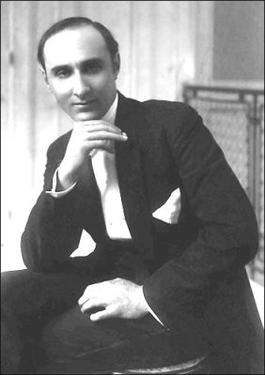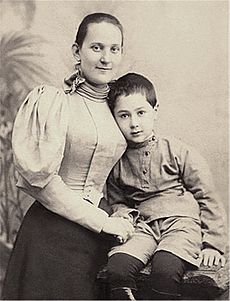Dimitri Tiomkin facts for kids
Dimitri Zinovievich Tiomkin (May 10, 1894 – November 11, 1979) was a famous Russian-born American composer and conductor. He created music for many movies, especially Westerns.
Tiomkin was trained in classical music in Russia. After the Russian Revolution, he moved to Berlin and then New York City. In 1929, he moved to Hollywood. There, he became well-known for his movie scores. Some of his famous Western films include High Noon, Red River, and Giant.
He was nominated for 22 Academy Awards (Oscars). He won four Oscars in total. Three were for Best Original Score for High Noon, The High and the Mighty, and The Old Man and the Sea. He also won an Oscar for Best Original Song for "The Ballad of High Noon" from the movie High Noon.
Contents
Dimitri Tiomkin's Early Life and Music Training
Dimitri Tiomkin was born in Kremenchug, a city now in Ukraine. His family was of Jewish background. His father was a respected doctor. His mother, Marie Tartakovskaya, was a musician. She started teaching Dimitri piano when he was very young. She hoped he would become a professional pianist.
Tiomkin studied music at the Saint Petersburg Conservatory in Russia. He learned piano from Felix Blumenfeld. He also studied harmony and counterpoint with Alexander Glazunov.
After the Russian Revolution, there were fewer chances for classical musicians in Russia. So, Tiomkin moved to Berlin in 1921 to live with his father. In Berlin, he continued to study piano. He also started composing light classical and popular music. He played his first big concert as a pianist with the Berlin Philharmonic orchestra.
Later, he moved to Paris with a friend, Michael Khariton. They performed piano duets together.
Moving to the United States
In 1925, Tiomkin and his friend were invited to perform in New York. They moved to the United States and performed on vaudeville stages. They played music for a ballet group led by Albertina Rasch. Dimitri and Albertina became close and married in 1927.
While in New York, Tiomkin performed at Carnegie Hall. He played modern music by famous composers. In 1928, he played George Gershwin's Concerto in F in Paris. Gershwin himself was in the audience.
After a big economic downturn in 1929, there was less work in New York. Tiomkin and his wife moved to Hollywood. His wife was hired to create dance scenes for movies. Tiomkin worked on some smaller films. His first major film music project was for Alice in Wonderland in 1933. In 1937, he broke his arm, which ended his dream of being a concert pianist. He then focused completely on composing music for films.
Working with Director Frank Capra
Dimitri Tiomkin got his first big chance from director Frank Capra. Capra chose him to write the music for the film Lost Horizon (1937). This movie helped Tiomkin become well-known in Hollywood. He also became an American citizen that same year.
He worked on several other films with Frank Capra. These included You Can't Take It With You (1938) and Mr. Smith Goes to Washington (1939). During World War II, he composed music for Capra's Why We Fight film series. These films helped explain to American soldiers why the United States was fighting in the war. They also helped gain public support for the war.
Tiomkin felt that Capra helped him explore new musical styles. He moved from a European classical style to a more American sound.
The Success of High Noon
In 1952, Tiomkin composed the music for the Western film High Noon. The movie's main song was "Do Not Forsake Me, Oh My Darlin'". When the film was first shown, it did not do well. Tiomkin decided to buy the rights to the song. He released it as a single with singer Frankie Laine. The song became a huge hit around the world.
Because the song was so popular, the studio released the movie four months later. This time, the song was sung by country star Tex Ritter. The film received seven Oscar nominations. It won four awards, including two for Tiomkin. He won for Best Original Music and Best Song. Many experts believe his music helped save the movie.
Tiomkin was one of the first composers to win two Oscars for the same dramatic film. The song's lyrics tell the whole story of High Noon. Tiomkin built the entire movie score around this one Western-style song. He also used a subtle harmonica sound to give the film a rustic feel.
Tiomkin won two more Oscars in later years. One was for The High and the Mighty (1954). The other was for The Old Man and the Sea (1958). When he won his Oscar in 1955, he thanked famous classical composers. These included Beethoven and Tchaikovsky.
Film Genres and Other Works
Many of Tiomkin's most famous scores were for Western films. These movies were very popular during his time. His first Western was Duel in the Sun (1946). Besides High Noon, he also scored Giant (1956) and Gunfight at the O.K. Corral (1957). He worked with actor John Wayne on several films, including The Alamo (1960).
Tiomkin also composed music for many other types of movies. He scored historical dramas like Cyrano de Bergerac (1950). He also worked on war movies such as The Guns of Navarone (1961). He even composed for suspense thrillers like Shadow of a Doubt (1943) and Dial M for Murder (1954) for director Alfred Hitchcock.
Television Work
Besides movies, Tiomkin also wrote music for television shows. He composed the memorable theme songs for Rawhide (1959) and Gunslinger.
Tiomkin also made a few guest appearances on TV shows. He was a mystery guest on What's My Line?. He also appeared on Jack Benny's show and on the quiz program You Bet Your Life with Groucho Marx.
Dimitri Tiomkin's Music Style
Dimitri Tiomkin was a trained classical pianist. But he learned how to create powerful film scores for almost any kind of story. He was very good at creating themes and sounds that fit the movie's story and visuals.
Tiomkin paid close attention to the actors' voices when composing. He would listen to their voices on set. He would also talk to them to understand the sound of their voices. This helped him make the music fit perfectly with the film.
Death and Lasting Impact
Dimitri Tiomkin passed away in London, England, in 1979. He was buried in California.
During the 1950s, Tiomkin was one of the highest-paid film composers. He often composed music for a new movie almost every month. Between 1948 and 1958, he scored 57 films. In 1952 alone, he composed music for nine films, including High Noon.
He was honored in Russia, his home country. In 2014, his theme songs from It's a Wonderful Life and Giant were played at the closing ceremony of the 2014 Winter Olympics in Sochi, Russia.
Tiomkin was the first film composer to write both the main theme song and the full score for a movie. He used this style in many of his Westerns. The theme song would be repeated throughout the film, connecting the whole story. This idea of using a title song that runs through the movie had a big impact on Hollywood films for many years.
Many of Tiomkin's film scores were released as albums. The theme song to High Noon has been recorded by many different artists. In 1999, the US Postal Service honored him with his own stamp.
The American Film Institute ranked Tiomkin's score for High Noon as one of the 10 greatest film scores ever. His music for other films like The Alamo and Lost Horizon was also recognized.
Awards and Nominations
Dimitri Tiomkin received many awards and nominations for his film music.
Academy Awards (Oscars)
- 1959 – Won for "Best Music, Scoring of a Dramatic or Comedy Picture" for The Old Man and the Sea (1958)
- 1955 – Won for "Best Music, Scoring of a Dramatic or Comedy Picture" for The High and Mighty (1954)
- 1953 – Won (with Ned Washington) for "Best Music, Original Song" for High Noon (1952) ("Do Not Forsake Me, Oh My Darlin'")
- 1953 – Won for "Best Music, Scoring of a Dramatic or Comedy Picture" for High Noon (1952)
- 1972 – Nominated for Tchaikovsky (1969)
- 1965 – Nominated for The Fall of the Roman Empire (1964)
- 1964 – Nominated for "So Little Time" from 55 Days at Peking (1963)
- 1964 – Nominated for 55 Days at Peking (1963)
- 1962 – Nominated for "Town Without Pity" from Town Without Pity (1961)
- 1962 – Nominated for The Guns of Navarone (1961)
- 1961 – Nominated for "The Green Leaves of Summer" from The Alamo (1960)
- 1961 – Nominated for The Alamo (1960)
- 1961 – Nominated for The Young Land (1959)
- 1958 – Nominated for "Wild Is the Wind" from Wild Is the Wind (1957)
- 1957 – Nominated for "Friendly Persuasion" from Friendly Persuasion (1956)
- 1957 – Nominated for Giant (1956)
- 1955 – Nominated for "The High and the Mighty" from The High and Mighty (1954)
- 1950 – Nominated for Champion (1949)
- 1945 – Nominated for The Bridge of San Luis Rey (1944)
- 1944 – Nominated for The Moon and Sixpence (1943)
- 1943 – Nominated for The Corsican Brothers (1941)
- 1940 – Nominated for Mr. Smith Goes to Washington (1939)
Golden Globe Awards
- 1965 – Won for "Best Original Score" for The Fall of the Roman Empire (1964)
- 1962 – Won for "Best Motion Picture Song" for Town without Pity (1961)
- 1962 – Nominated for "Best Motion Picture Score" for The Guns of Navarone (1961)
- 1961 – Nominated for "Best Original Score" for The Alamo (1960)
- 1957 – Received a "Special Award" for his film music
- 1955 – Received a "Special Award" for his musical contributions to movies
- 1953 – Won for "Best Motion Picture Score" for High Noon (1952)
|
See also
 In Spanish: Dimitri Tiomkin para niños
In Spanish: Dimitri Tiomkin para niños
 | Roy Wilkins |
 | John Lewis |
 | Linda Carol Brown |



